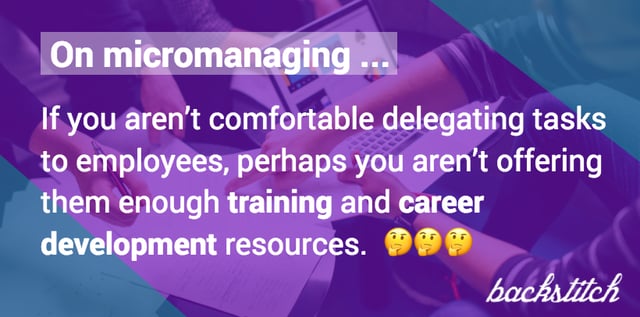Nobody likes to be micromanaged — it feels discouraging, demoralizing and can represse an employee’s ability to get their job done right.
And because of that, no one wants to admit that they might be a micromanager themselves. Instead, they hide behind the guise of a proactive, detail-oriented and perfectionistic persona.
When your attention to detail and accuracy is in overdrive, you find yourself being a micromanager. This behavior is one of the most common patterns exhibited by leaders that negatively influences company culture.
There is a difference between actively supporting your employees and micromanaging — intervening in their projects and undermining their skillset. When you doubt your employees you are teaching to them to doubt themselves, which hinders their ability to deliver. You’ll begin to watch your worry become a self-fulfilling prophecy.
Although a microscopic, laser focused perspective is often an impressive skill, it can become tainted by one thing: the need for control.
Micromanagers honestly believe that by poking and prodding their employees, that they are saving company time and money. They downplay their impact by rationalizing to themselves: “too much is at stake for the company if something goes wrong” or “I just feel better when I keep tabs on my employees.”
This is because they don’t trust their employees to produce good work on their own. This need for control most likely stems from fear or insecurity. And if you’re guilty of micromanaging, the only way to overcome that is to address your fear head on.
Here are some questions to ask yourself and reflect upon.
Do you trust your employees?
Often times, a micromanager consciously believes they trust their employees to do their jobs well — even if their actions don’t reflect that. Get real with yourself and ask yourself if you are treating your employees like you trust them.
When a healthy amount of trust is in place, team members are more likely to take initiative and share fresh ideas. They aren’t afraid of being reprimanded for providing feedback and asking for support.
Not sure if you’re demonstrating your trust? Communicate with team members. Tell them, “I am confident that you will do the job well.” Ask them, “Do you feel that I am supporting you efficiently? Let me know how I can offer my assistance.”
Do your employees have the resources they need?
Perhaps, you honestly do not trust your employees. Why could that be?
Sometimes this indicates a systematic company problem. For example, does your organization provide comprehensive training programs for each new-hire? Do you provide employees with the resources and career development opportunities they need to perform their best?
Providing workers with an abundant supply of tools, materials and information can help ensure that tasks are completed efficiently — so you don’t have to keep bugging employees.
Are your expectations clear?
Instead of pestering employees during the beginning, middle and end of a workflow, spend more time communicating your expectations. When you assign a task, team members should know exactly what is expected of them.
It’s important to over communicate during this step. Let them know exactly what success looks like and tell them which mistakes to avoid.
(Click to Tweet 🖕🖕🖕)
Are you wasting time?
Although their pestering is often done with a good intention, micromanagers tend to become a bottleneck for company-wide projects.
Remember, it’s normally not in a manager’s job description to focus on the minutia of employee tasks. When you spend too much time doing so, this often done at the expense of big-picture thinking.
It is common for micromanagers to waste time meddling with employees’ when they could have been strategizing or brainstorming for a long-term company goal.
Not only can micromanaging waste a manager’s time, but an employee's time as well. Instead of focusing directly on the task at hand, team members are answering to their boss. (Besides, it’s hard for anybody to be super productive with an anxious boss breathing down their neck.)
If you’ve identified yourself as a micromanager, this can be a tough habit to break. Go easy on yourself. Pivot your detail-oriented, accuracy-driven abilities from a focus on your employees to your own responsibilities.
And remember, every individual has a process that works best for them. As a manager, you should focus more on employee results than their process.


